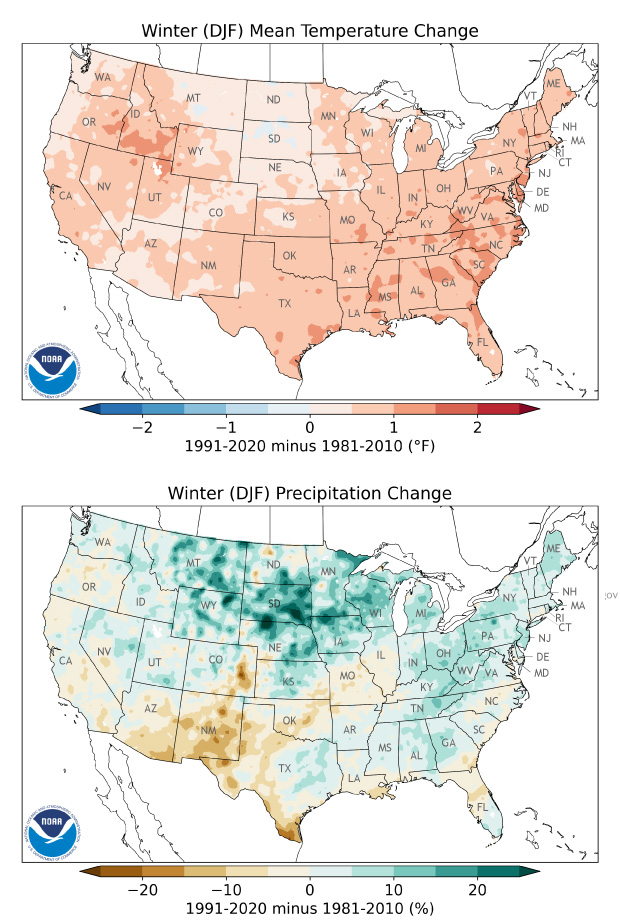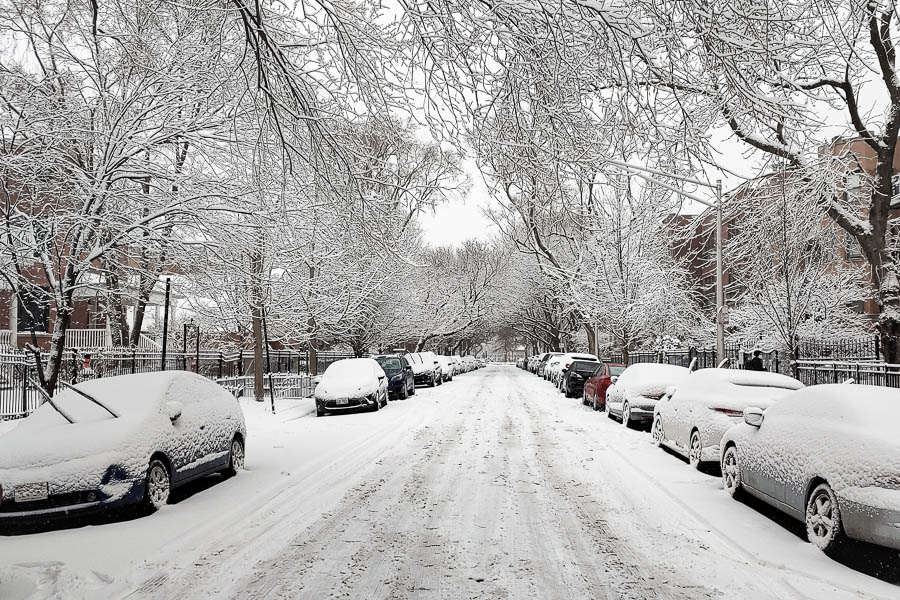Well, if you're a climatologist, it's a calculated value based on a 30-year period, updated every 10 years. And the 19991-2020 climate normals for the US will come out this May. Meanwhile, the National Centers for Environmental Information (NCEI) has released some teaser images:

NOAA senior science writer Rebecca Lindsey explains:
These images are a sneak peak at how the new normals for winter temperature (top) and precipitation (bottom) are different from the current normals, which cover 1981-2010. Consistent with the long-term warming trend, winter is warmer across most of the contiguous United States, but the amount of warming ranges from nearly 0.0 (light pink) to 1.5 degrees [Fahrenheit] (darker pink) Fahrenheit depending on the location. There are even a few small areas of the Northern Plains where the normal winter temperature for 1991-2020 is slightly cooler than the 1981-2010 normal (light blue).
There’s a lot more variation in the changes in winter precipitation, which includes both rain and snow. The map shows the percent difference in normal winter precipitation in the new normal versus the old normals. The Northern Plains and Upper Midwest have seen the biggest percent increases in normal winter precipitation, while the biggest percent decreases occurred in the Southwest and Southern Plains, including Colorado’s Eastern Plains. (In absolute terms, these changes are equivalent to only fractions of an inch of liquid water because these locations are normally quite dry during the winter.)
Having seen other preliminary data, I expect that the December temperature normals will be the most surprising. Also, NCEI will prepare a second full set of 15-year normals covering 2006-2020 as well. It wasn't reported whether NCEI will produce 15-year normals on a 5-year schedule, however.
I get to turn off and put away my work laptop in a little bit in preparation for heading back to the office on Monday morning. I can scarcely wait.
Meanwhile, I've got a few things to read:
OK, one more work task this month, then...I've got some other stuff to do.
I read the news today, oh boy. And one of the stories reminded me of this movie:
See if you can guess which one.
- The FBI charged Richard Michetti, of Ridley Park, Pa., with several crimes related to the January 6 insurrection after his ex-girlfriend turned over photos, videos, and texts of Michetti storming the Capitol. She did so shortly after he called her a "moron" in one of the texts.
- The North Atlantic Overturning Circulation has declined to its lowest point in over a millennium, threatening to make Northern Europe's weather more like Canada's and to raise sea levels along the US Atlantic coast. Note that global warming slowing the ocean's thermohaline circulation was predicted back in the 1980s.
- Following Monday's unsigned order from the United States Supreme Court, Mazars USA, the XPOTUS's accounting firm, has turned over 8 years of Trump Organization tax records to Manhattan District Attorney Cyrus Vance, Jr.
- Dominion Voting Systems' legal filings against Rudy Giuliani and MyPillow CEO Mike Lindell spared no one's feelings.
- The New Yorker's Eric Lach puzzles over "the sound and fury of Andrew Cuomo."
- If you're a mom at wit's end trying to manage children during the pandemic, Jennifer Senior wants you to know you're not alone.
Finally, Chicago managed 58 hours of above-freezing temperatures (from 1pm Monday until 11pm yesterday) leaving us with only 15 cm of snow on the ground and a chance it'll all be gone by this time tomorrow. The forecast calls for daytime highs above freezing every day through next week, possibly hitting 10°C over the weekend. Spring!
Annalee Newitz, author of Four Lost Cities, explains that urban collapse doesn't look anything like dystopian fiction would have it:
It’s always lurking just around the corner, seductive and terrifying, but it never quite happens. Lost-city anxieties, like the ones aroused by the pandemic, result from a misunderstanding of what causes cities to decline. Pandemics, invasions, and other major calamities are not the usual culprits in urban abandonment. Instead, what kills cities is a long period in which their leaders fail to reckon honestly with ongoing, everyday problems—how workers are treated, whether infrastructure is repaired. Unsustainable, unresponsive governance in the face of long-term challenges may not look like a world-historical problem, but it’s the real threat that cities face.
This slow-motion catastrophe—a combination of natural disaster and political indifference—was far more important to [Angkor's] transformation than the Ayutthaya invasion [in 1431]. And it stands as a warning to many cities in the U.S. Without a coherent response from local government, cities lashed by climate change will gradually lose their populations. The demise won’t be spectacular, even if the storms are monstrous. Instead, people will leave in dribs and drabs, and the exodus could take generations.
So, I'm going to stay in Chicago, which will likely remain a thriving urban center for hundreds more years.
A 25-meter section of the Pacific Coast Highway slid into the Pacific about 30 km south of Big Sur this week:
Caltrans spokesperson Jim Shivers said the damage to the highway is called a slip out. "It's where we lose a part of the highway and now we're facing a project to clean and repair that stretch," Shivers said. "This is the only location we're aware of where this happened in the storm. Our maintenance team is patrolling the highway now to look for other damage."
The closure is in Rat Creek between MPM 40 and the San Luis Obispo county line, the California Highway Patrol said.
A common phenomenon called an "atmospheric river" delivered half a meter of rainfall to the region last week. CA-1 has a history of sliding into the ocean; for example, the area just south of Pacifica, Calif., known as "Devil's Slide" collapsed so frequently that that Caltrans bored two 1200-meter tunnels through solid rock from 2005 to 2013 to keep the road open.
I'm having a series of productive days lately, which has taken me away from wasting a bunch of time. So for example, I haven't yet today read these items:
And all of this on the coldest day in two years, in a month in which most days have had no sunlight. But hey, we're still having an abnormally-mild winter, so again, we're not complaining.
It's every other Tuesday today, so I'm just waiting for the last continuous-integration (CI) build to finish before deploying the latest software to our production environment. So far, so boring, just the way I like it. Meanwhile, in the real world:
- In a symbolic but meaningless vote, all but 5 Republican members of the US Senate voted to let the XPOTUS off the hook for inciting an insurrection against, well, them, as this way they believe they get to keep his followers at no cost to themselves. If this past year were a novel, the next sentence might begin with "Little did they know..." Which, you know, describes those 45 Republicans to a T.
- Dutch police arrested more than 180 people in Amsterdam and Rotterdam for rioting against Covid-19 lockdowns: "A leading Dutch criminologist, Henk Ferwerda, said the riots involved 'virus deniers, political protesters and kids who just saw the chance to go completely wild – all three groups came together.'"
- Air travelers across the US can rejoice that CNN Airport News will go away on March 31st.
- Over 1 teratonne of ice melted over each of the past few years, increasing concerns about global sea level rises.
- Two mathematicians argue that time-travel paradoxes don't exist, because the universe routes around them.
Finally, snow continues to fall in Chicago, so far accumulating to about 100 mm by my house and as of noon about 125 mm at O'Hare. Calling this a "snowstorm" seems a bit over the top as it's coming down at under 10 mm per hour and forecast to stop before too long. Plus it's barely below freezing for now—but forecast to cool down to -11°C by Wednesday night before creeping above freezing Friday and Saturday. So we might have a blanket of snow for a bit. Still, it's the most snow we've gotten all season, with less than 5 weeks to go before meteorological spring starts March 1st. I'm OK with this mild winter, though it might presage a very hot summer.

Even though things have quieted down in the last few days (gosh, why?), the news are still newing:
Finally, last August's derecho caused "the most damage in the least amount of time" of any weather disaster on record.
We've only had six days where the temperature stayed below freezing since November 1st, and the third year in a row where we've not had a temperature below -18°C by this point. This shouldn't surprise anyone who knows that 2020 either tied or set the record for warmest year in history:
[An] analysis of global temperatures, by the NASA Goddard Institute for Space Studies and released Thursday, found that 2020 was slightly warmer than 2016. But the difference was insignificant, the institute’s director, Gavin Schmidt, said in an interview.
“Effectively it’s a statistical tie,” he said.
Other analyses issued Thursday, one by the National Oceanic and Atmospheric Administration and another by Berkeley Earth, an independent research group in California, found that 2020 was slightly cooler than 2016, as did one published last week by the Copernicus Climate Change Service in Europe. But the difference was small enough to not be statistically significant.
With the 2020 results, the last seven years have been the warmest since the beginning of modern record-keeping nearly a century and a half ago, Dr. Schmidt said.
But the numbers are only a small part of the story. As climate scientists have predicted, the world is seeing an increase in heat waves, storms and other extreme weather as the planet warms, and in disasters like droughts, floods and wildfires that result. Last year offered no respite, with record fires in Australia and California, and severe drought in central South America and the American Southwest.
Some climate forecasters had thought that the arrival of cooler sea-surface temperatures in the Pacific Ocean — part of the recurring global climate phenomenon called La Niña — would tamp down temperatures this year. It is difficult to quantify the influence of La Niña, but it is clear that any effect was eclipsed by the emissions-related rise in temperatures.
As I've said for a very long time, global warming will make Chicago a much more comfortable place to live for a century or two at least, though changing precipitation patterns could seriously alter the Great Lakes' shorelines in ways that make us much less comfortable later on.
We're so close to ending 2020 that I can almost taste it. (I hope to be tasting tacos in a few minutes, however.) True to form, 2020 has apparently decided not to leave quietly:
Finally, the Washington Post's Michael Rosenwald reports that Bloom asked 28 historians to determine whether 2020 was the worst year ever. It wasn't even close.